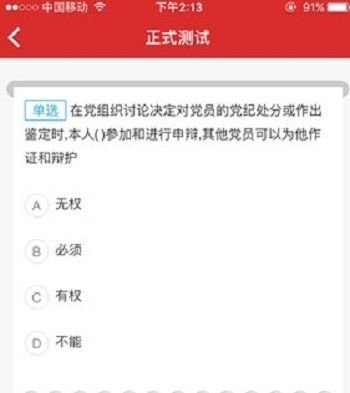A series of phone applications related to the Chinese Communist Party have been developed in China recently.
Every morning, Sui, a Chinese official, logs into his mobile phone.
In addition to the local government of Hunan province, where Sui is working, other party agencies also use phone applications to monitor and evaluate party members’ performance.
The application not only provides an online course to learn about party doctrine but also allows users to pay party membership fees and expand social relationships.
The most basic function of these applications is to provide documents for members about party knowledge and regulations, as well as help party members follow the latest news about senior party leaders and developers.
Among these documents, the speeches of Chinese President Xi Jinping, who is also General Secretary of the CPC Central Committee, are most widely read.
For customers (i.e., grass-roots party organizations), one of the most popular functions of more than 100 party-building apps is being able to evaluate the performance of users (i.e., party members run by these organizations).
All party members’ activities are displayed on the apps, providing evidence of their use, explained Zeng Ying, project manager at Fujian Huayu Educational Technology Company.
Some apps also have tests to assess party knowledge, such as `What should Party members do to have the right working style?`
An app developed specifically for construction company CTCE also ranks users monthly and weekly, based on study habits and test results, said Wang Shizhou, head of CTCE’s organization department.
Those who fail or do poorly will be criticized, while those with good results will be given points, helping them move up the rankings or exchange their points for rewards like laptops or pens, Wang said.
He added that the company is developing a new version, allowing users to vote for the 10 best party members of the year out of the company’s 10,000 candidates.
For companies like CTCE, where employees work mainly on construction sites across China, gathering all employees in one place for training or voting is difficult and expensive.
Another commonly used effective application is `Party member’s bookbag,` said Wang Tong, deputy party secretary of the People’s Publishing House.
This application is used in remote areas such as Ngai autonomous county in the Tibet autonomous region.
The `party member’s briefcase` is being used by 1,244 customers who are Chinese state agencies, including the State Administration of Press, Publishing, Radio, Film and Television, or the CPC Committee
Another app designed for CPC members in Laizhou, Yantai, Shandong province also introduces agricultural specialties and tourist attractions along with specific contact information.
These applications require thousands to millions of yuan (one million yuan equals 152,000 USD) to develop and maintain, and are mostly designed for CPC committees at various levels and for party organizations at local units.
According to service providers, most applications are available online and can be downloaded easily.
Experience
Many party member-only apps also provide social communication channels for users with functions similar to WeChat (China’s largest social networking app).
Ahead of the 19th national party congress about to be held on October 18, demand for these applications is increasing rapidly, Zeng said.
Because no party member wants to fall behind in party work, these applications also put more pressure on party members to properly and promptly demonstrate loyalty and enthusiasm for the party, according to Professor Sui’s assessment.
Although applicators and customers appreciate the effectiveness and convenience of these apps, among users who are party members, they have mixed opinions about these apps.
`I feel motivated to spend more time and effort researching the party knowledge contained in the application,` commented Chen Lixia, a party member of Henan province.

A multiple choice question about the party charter on the phone application.
However, there are also opinions that being forced to download and use these applications causes additional work burden for party members.
`Users simply need to pay someone to take the test for them to get a high score, or easily find the answer online,` Sui said.
`Using the Internet and large data warehouses to help build the party is a trend, bringing many conveniences to management at local party committees. However, this should not be considered a competition. These applications
By the end of 2016, China had a total of 89.44 million CPC party members, managed by 4.5 million grassroots party organizations.










